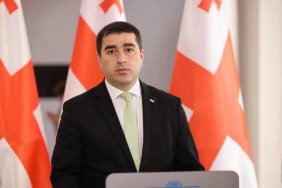Shalva Papuashvili, the Chairman of the Parliament, said on Monday the legislative body would address President Salome Zourabichvili’s veto on the foreign influence bill during the session of the Bureau, claiming the ruling party planned to override it.
He said the veto, accompanied by motivated remarks, would be forwarded to the Legal Affairs Committee for deliberation. "Technically, the draft of the president's veto has been presented," stated Papuashvili, noting that the committee would discuss the remarks before bringing them to the plenary session for a vote next week.
Papuashvili preemptively revealed the parliamentary majority's intent, stating, "the parliament will certainly override this veto." The President had vetoed the bill on May 18, branding it a "Russian law" that conflicts with the nation's constitution and European standards. Utilizing the veto process, Zourabichvili appended a single sentence to the legislation - “this law is valid for one day after its implementation."
The bill, which had passed through all three readings in Parliament before being vetoed, is now under reconsideration by the legislative body. With the parliamentary majority wielding over 80 votes, the support of 76 deputies is sufficient to override the veto.
Per protocol, Parliament will initially vote on the president's motivated remarks. Should they be dismissed, a subsequent vote on the bill passed in three readings, requiring at least 76 supporters, will determine whether the veto is overridden.
The constitution does not stipulate a timeframe for Parliament to decide on overriding or accepting a veto once it's been issued. Despite widespread protests in Georgia against the bill and significant criticism from partner states urging its rejection, the ruling majority of Georgian Dream passed the "Bill on Transparency of Foreign Influence" in its third reading on March 14, securing 84 votes.
The bill, endorsed in all three readings, designates non-governmental and media organizations whose income exceeds 20 percent from abroad as entities serving the interests of a foreign power. They are required to register in a specialized registry and submit financial declarations annually, with failure resulting in a 25, 000 GEL fine upon first offense.






